Unit 13 We're trying to save the earth! Section A(Grammar Focus-4c)课件(共26张PPT)
文档属性
| 名称 | Unit 13 We're trying to save the earth! Section A(Grammar Focus-4c)课件(共26张PPT) | 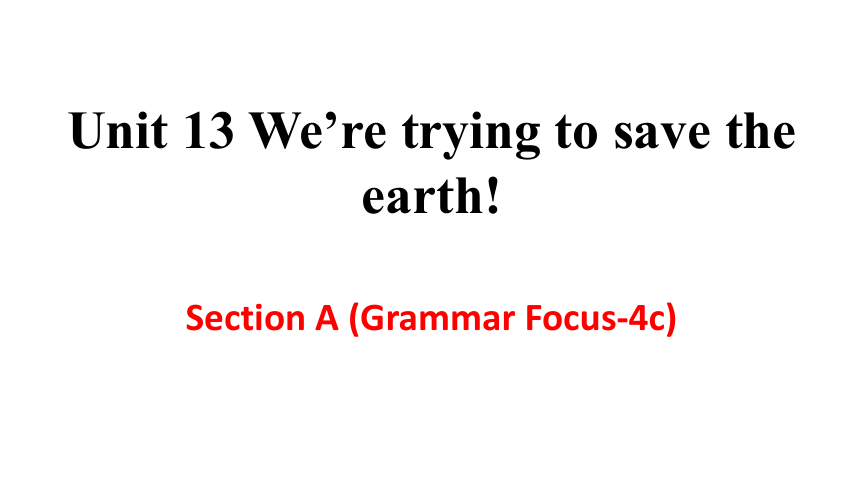 | |
| 格式 | zip | ||
| 文件大小 | 610.6KB | ||
| 资源类型 | 教案 | ||
| 版本资源 | 人教新目标(Go for it)版 | ||
| 科目 | 英语 | ||
| 更新时间 | 2021-11-26 20:15:38 | ||
图片预览

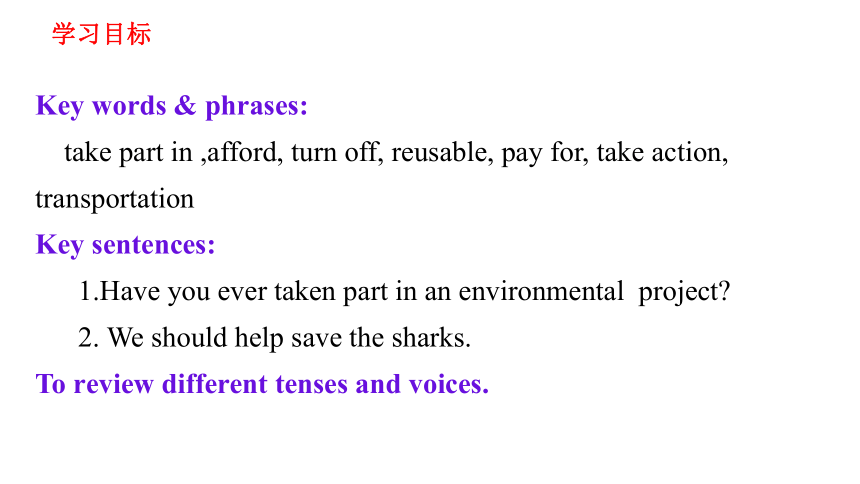
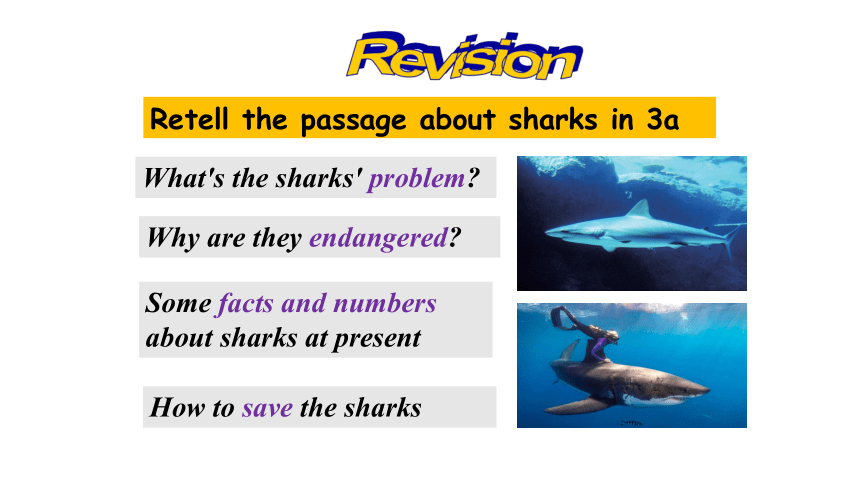
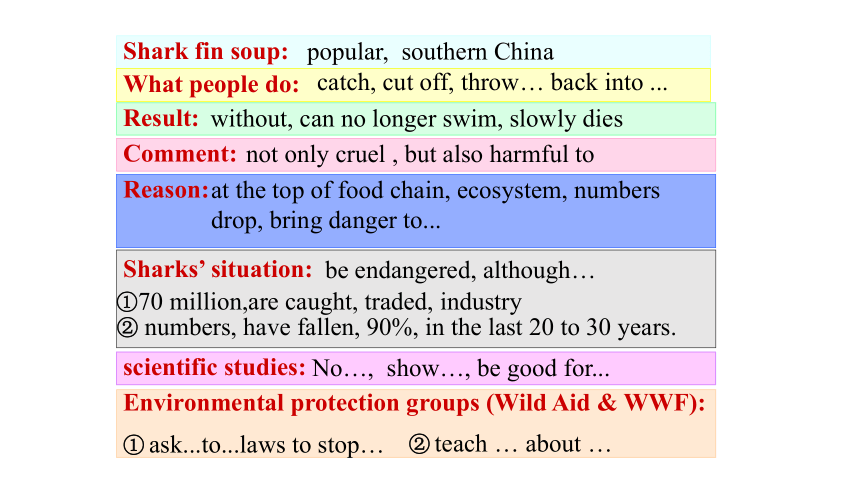

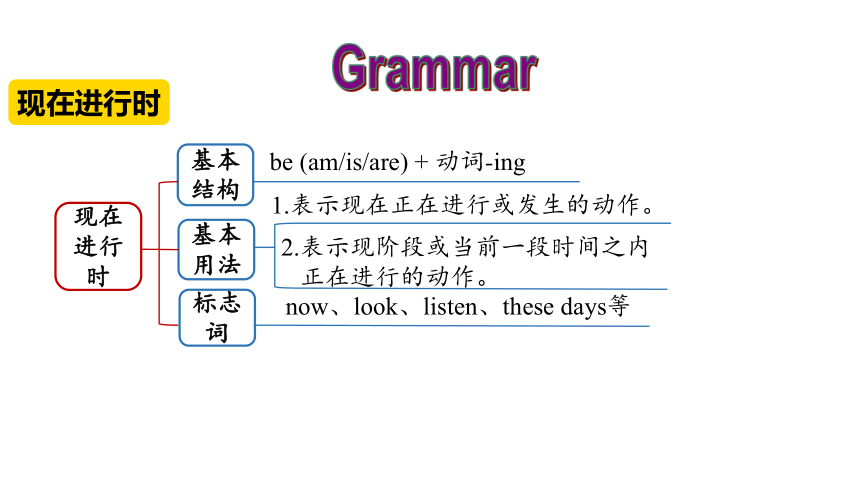

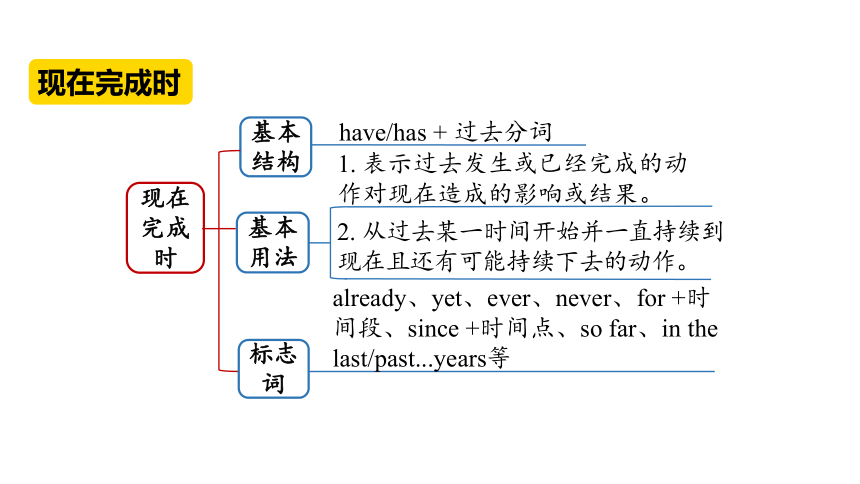
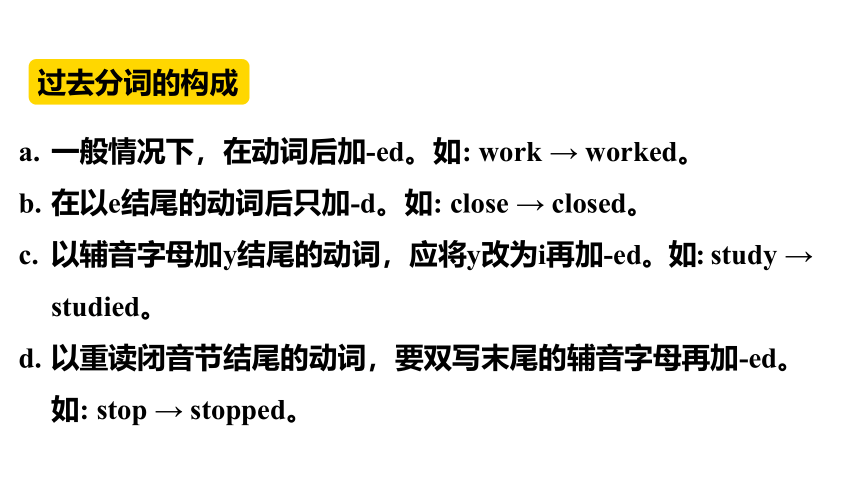
文档简介
(共26张PPT)
Section A (Grammar Focus-4c)
Unit 13 We’re trying to save the earth!
学习目标
Key words & phrases:
take part in ,afford, turn off, reusable, pay for, take action, transportation
Key sentences:
1.Have you ever taken part in an environmental project
2. We should help save the sharks.
To review different tenses and voices.
Revision
Retell the passage about sharks in 3a
What's the sharks' problem
Why are they endangered
Some facts and numbers about sharks at present
How to save the sharks
Reason:
Comment:
Shark fin soup:
What people do:
Result:
Sharks’ situation:
Environmental protection groups (Wild Aid & WWF):
scientific studies:
at the top of food chain, ecosystem, numbers drop, bring danger to...
popular, southern China
catch, cut off, throw… back into ...
without, can no longer swim, slowly dies
not only cruel , but also harmful to
be endangered, although…
② numbers, have fallen, 90%, in the last 20 to 30 years.
② teach … about …
① ask...to...laws to stop…
①70 million,are caught, traded, industry
No…, show…, be good for...
Presentation
Grammar Focus
We’re trying to save the earth. Present progressive
The river used to be so clean. used to
The air is badly polluted. Passive voice
No scientific studies have shown that shark fins are good for health. Present perfect
We should help save the sharks. Modal verbs
Grammar
现在进行时
现在进行时
基本
结构
基本
用法
标志词
be (am/is/are) + 动词-ing
1.表示现在正在进行或发生的动作。
2.表示现阶段或当前一段时间之内
正在进行的动作。
now、look、listen、these days等
a.一般情况下,在动词词尾后加-ing。
如:go → going。
b.以不发音的e结尾的动词,去掉e加-ing。
如:have → having。
c.以重读闭音节结尾的动词,末尾只有一个辅音字母,双写这个辅音字母,再加-ing。
如:run → running。
动词-ing形式的构成
现在完成时
现在完成时
基本
结构
基本
用法
标志词
have/has + 过去分词
1. 表示过去发生或已经完成的动作对现在造成的影响或结果。
2. 从过去某一时间开始并一直持续到现在且还有可能持续下去的动作。
already、yet、ever、never、for +时间段、since +时间点、so far、in the last/past...years等
过去分词的构成
一般情况下,在动词后加-ed。如: work → worked。
在以e结尾的动词后只加-d。如: close → closed。
以辅音字母加y结尾的动词,应将y改为i再加-ed。如: study → studied。
以重读闭音节结尾的动词,要双写末尾的辅音字母再加-ed。如: stop → stopped。
不规则动词的过去分词:
AAA型 put put put
AAB型 beat beat beaten
ABA型 become became become
ABB型 get got got/gotten
ABC型 begin began begun
被动语态
主动语态表示主语是动作的执行者。被动语态表示主语是动作的承受者,即行为动作的对象。
I cleaned my room. → My room was cleaned by me.
I saw him cross the road and enter the shop. → He was seen to cross the road and enter the shop.
在含有使役动词 (如:make) 或感官动词 (see、watch、notice、hear等) 的主动语态的句子中,这些词后常跟省略to的动词不定式,但是改为被动语态时则要把省去的to还原。
被动语态的构成
被动语态的基本结构:助动词be + 及物动词的过去分词
一般现在时的被动语态:am/is/are + 过去分词
一般过去时的被动语态:was/were + 过去分词
一般将来时的被动语态:will be/is going to be + 过去分词
含情态动词的被动语态:情态动词 + be + 过去分词
1. 情态动词一般没有人称和数的变化。
2. 情态动词后接动词原形。
3. 常用的情态动词有:can/could、may/might、must/have to、should/ought to、would、need等。
情态动词
used to
used to意为“过去常常做某事”,后接动词原形。
used to句型的否定句形式:didn’t use to...
used to句型的一般疑问句形式:Did + 主语 + use to...
used to do表示过去常常做某事,而现在往往不做了;
be used to doing表示习惯于做某事。
Practice
4a
Fill in the blanks with the correct forms of the verbs in brackets.
Joe: ______ you ever ________ (take) part in an
environmental project
Ken: Yes, I have. I _______ (help) with a Clean-Up Day
last year. It was __________ (consider) the biggest
clean-up project this city______ ever ________ (have).
Joe: How many people ________ (take) part
Have
taken
helped
considered
had
had
took
Ken: I ___________ (think) more than 1,000 people
______(come) to help out.
Joe: That’s fantastic! I guess everyone in this city is
______ (try) to improve the environment.
Ken: Yes, we can’t afford to________ (wait) any longer
to take action!
think
came
trying
wait
4b
Fill in the blanks with the appropriate modal verbs from the box.
People _________ think that big things__________________ be done to save the earth. Many forget that saving the earth begins with small things. For example, you ______________ save electricity by turning off the lights when you leave a room. You _______________ also use reusable bags instead of plastic bags.
can
would
could
have to
should
must
may/
might
may/might
should/have to/must
can/could/should
can/could/should
adj. 可重复使用的;可再次使用的
关掉
I think it’s a great idea that you now _______ pay for
plastic bags in some stores. And instead of driving to school or work, you _______________ ride your bike or walk. If it’s far, you __________ take the bus. All these small things __________ add up and become big things that ______________ improve the environment. Let’s take action now!
have to
can/could/should
can/could
can/could
would/can/could
付费;付出代价
采取行动
4c
Make a list of things that people can do to help the environment and discuss your list with your partner.
I think that everyone should use public transportation.
I disagree. It’s difficult for parents with young children to use public transportation...
use public transportation
n. 运输业;交通运输
use public transportation (n.交通运输);
turn off the lights when you leave a room;
use reusable bags instead of plastic bags;
ride your bike or walk to school or work;
stop using paper napkins(餐巾纸);
recycle books and paper...
Discussion
Language points
1. Have you ever taken part in an environmental project
(教材P100 4a)
take part in 参加
take part in多指参加会议或集体性的工作或活动,且参加者在其中发挥一定的作用。
Li Lanjuan headed for Wuhan and took an active part in the battle.
2. Yes, we can’t afford to wait any longer to take action!
(教材P100 4a)
afford / f (r)d / v. 承担得起(后果);买得起
afford作动词,常用在can、could、be able to等之后。afford sth.“买得起某物”;afford to do sth.“负担得起做某事”。
I can’t afford the new TV.
I hope I can afford to buy a big house one day.
Exercises
一、单项选择
1. Listen! Our science teacher ________ the use of the robot.
A. explains B. explained
C. is explaining D. has explained
2. “I’m still working because I’m still capable and hope to guide more young people,” said Wu Mengchao when he _______.
A. is interviewed B. is interviewing
C. was interviewed D. was interviewing
C
C
3.— Our computer is working again!
— Yes. Our IT teacher ________ it. It took him about an hour.
A. has fixed B. will fix C. is fixing D. was fixing
4.— Must I wash my clothes at once, Mom
— No, you ________. You ________ wash them before 5:00 p.m.
A. needn’t; may B. mustn’t; may
C. needn’t; need D. mustn’t; must
A
A
5.What an amazing robot! It _______ cook more than 5,000 dishes.
A. shall B. need C. must D. can
6. — Only ten tickets What do you mean There _______ be twelve.
— Sorry, Linda. Jacky and Tim took two tickets away.
A. should B. will C. can D. may
D
A
Homework
Preview the new words and phrases in Section B(1a-1e).
Do the exercises in students’ book.
Section A (Grammar Focus-4c)
Unit 13 We’re trying to save the earth!
学习目标
Key words & phrases:
take part in ,afford, turn off, reusable, pay for, take action, transportation
Key sentences:
1.Have you ever taken part in an environmental project
2. We should help save the sharks.
To review different tenses and voices.
Revision
Retell the passage about sharks in 3a
What's the sharks' problem
Why are they endangered
Some facts and numbers about sharks at present
How to save the sharks
Reason:
Comment:
Shark fin soup:
What people do:
Result:
Sharks’ situation:
Environmental protection groups (Wild Aid & WWF):
scientific studies:
at the top of food chain, ecosystem, numbers drop, bring danger to...
popular, southern China
catch, cut off, throw… back into ...
without, can no longer swim, slowly dies
not only cruel , but also harmful to
be endangered, although…
② numbers, have fallen, 90%, in the last 20 to 30 years.
② teach … about …
① ask...to...laws to stop…
①70 million,are caught, traded, industry
No…, show…, be good for...
Presentation
Grammar Focus
We’re trying to save the earth. Present progressive
The river used to be so clean. used to
The air is badly polluted. Passive voice
No scientific studies have shown that shark fins are good for health. Present perfect
We should help save the sharks. Modal verbs
Grammar
现在进行时
现在进行时
基本
结构
基本
用法
标志词
be (am/is/are) + 动词-ing
1.表示现在正在进行或发生的动作。
2.表示现阶段或当前一段时间之内
正在进行的动作。
now、look、listen、these days等
a.一般情况下,在动词词尾后加-ing。
如:go → going。
b.以不发音的e结尾的动词,去掉e加-ing。
如:have → having。
c.以重读闭音节结尾的动词,末尾只有一个辅音字母,双写这个辅音字母,再加-ing。
如:run → running。
动词-ing形式的构成
现在完成时
现在完成时
基本
结构
基本
用法
标志词
have/has + 过去分词
1. 表示过去发生或已经完成的动作对现在造成的影响或结果。
2. 从过去某一时间开始并一直持续到现在且还有可能持续下去的动作。
already、yet、ever、never、for +时间段、since +时间点、so far、in the last/past...years等
过去分词的构成
一般情况下,在动词后加-ed。如: work → worked。
在以e结尾的动词后只加-d。如: close → closed。
以辅音字母加y结尾的动词,应将y改为i再加-ed。如: study → studied。
以重读闭音节结尾的动词,要双写末尾的辅音字母再加-ed。如: stop → stopped。
不规则动词的过去分词:
AAA型 put put put
AAB型 beat beat beaten
ABA型 become became become
ABB型 get got got/gotten
ABC型 begin began begun
被动语态
主动语态表示主语是动作的执行者。被动语态表示主语是动作的承受者,即行为动作的对象。
I cleaned my room. → My room was cleaned by me.
I saw him cross the road and enter the shop. → He was seen to cross the road and enter the shop.
在含有使役动词 (如:make) 或感官动词 (see、watch、notice、hear等) 的主动语态的句子中,这些词后常跟省略to的动词不定式,但是改为被动语态时则要把省去的to还原。
被动语态的构成
被动语态的基本结构:助动词be + 及物动词的过去分词
一般现在时的被动语态:am/is/are + 过去分词
一般过去时的被动语态:was/were + 过去分词
一般将来时的被动语态:will be/is going to be + 过去分词
含情态动词的被动语态:情态动词 + be + 过去分词
1. 情态动词一般没有人称和数的变化。
2. 情态动词后接动词原形。
3. 常用的情态动词有:can/could、may/might、must/have to、should/ought to、would、need等。
情态动词
used to
used to意为“过去常常做某事”,后接动词原形。
used to句型的否定句形式:didn’t use to...
used to句型的一般疑问句形式:Did + 主语 + use to...
used to do表示过去常常做某事,而现在往往不做了;
be used to doing表示习惯于做某事。
Practice
4a
Fill in the blanks with the correct forms of the verbs in brackets.
Joe: ______ you ever ________ (take) part in an
environmental project
Ken: Yes, I have. I _______ (help) with a Clean-Up Day
last year. It was __________ (consider) the biggest
clean-up project this city______ ever ________ (have).
Joe: How many people ________ (take) part
Have
taken
helped
considered
had
had
took
Ken: I ___________ (think) more than 1,000 people
______(come) to help out.
Joe: That’s fantastic! I guess everyone in this city is
______ (try) to improve the environment.
Ken: Yes, we can’t afford to________ (wait) any longer
to take action!
think
came
trying
wait
4b
Fill in the blanks with the appropriate modal verbs from the box.
People _________ think that big things__________________ be done to save the earth. Many forget that saving the earth begins with small things. For example, you ______________ save electricity by turning off the lights when you leave a room. You _______________ also use reusable bags instead of plastic bags.
can
would
could
have to
should
must
may/
might
may/might
should/have to/must
can/could/should
can/could/should
adj. 可重复使用的;可再次使用的
关掉
I think it’s a great idea that you now _______ pay for
plastic bags in some stores. And instead of driving to school or work, you _______________ ride your bike or walk. If it’s far, you __________ take the bus. All these small things __________ add up and become big things that ______________ improve the environment. Let’s take action now!
have to
can/could/should
can/could
can/could
would/can/could
付费;付出代价
采取行动
4c
Make a list of things that people can do to help the environment and discuss your list with your partner.
I think that everyone should use public transportation.
I disagree. It’s difficult for parents with young children to use public transportation...
use public transportation
n. 运输业;交通运输
use public transportation (n.交通运输);
turn off the lights when you leave a room;
use reusable bags instead of plastic bags;
ride your bike or walk to school or work;
stop using paper napkins(餐巾纸);
recycle books and paper...
Discussion
Language points
1. Have you ever taken part in an environmental project
(教材P100 4a)
take part in 参加
take part in多指参加会议或集体性的工作或活动,且参加者在其中发挥一定的作用。
Li Lanjuan headed for Wuhan and took an active part in the battle.
2. Yes, we can’t afford to wait any longer to take action!
(教材P100 4a)
afford / f (r)d / v. 承担得起(后果);买得起
afford作动词,常用在can、could、be able to等之后。afford sth.“买得起某物”;afford to do sth.“负担得起做某事”。
I can’t afford the new TV.
I hope I can afford to buy a big house one day.
Exercises
一、单项选择
1. Listen! Our science teacher ________ the use of the robot.
A. explains B. explained
C. is explaining D. has explained
2. “I’m still working because I’m still capable and hope to guide more young people,” said Wu Mengchao when he _______.
A. is interviewed B. is interviewing
C. was interviewed D. was interviewing
C
C
3.— Our computer is working again!
— Yes. Our IT teacher ________ it. It took him about an hour.
A. has fixed B. will fix C. is fixing D. was fixing
4.— Must I wash my clothes at once, Mom
— No, you ________. You ________ wash them before 5:00 p.m.
A. needn’t; may B. mustn’t; may
C. needn’t; need D. mustn’t; must
A
A
5.What an amazing robot! It _______ cook more than 5,000 dishes.
A. shall B. need C. must D. can
6. — Only ten tickets What do you mean There _______ be twelve.
— Sorry, Linda. Jacky and Tim took two tickets away.
A. should B. will C. can D. may
D
A
Homework
Preview the new words and phrases in Section B(1a-1e).
Do the exercises in students’ book.
同课章节目录
- Unit 1 How can we become good learners.
- Section A
- Section B
- Unit 2 I think that mooncakes are delicious!
- Section A
- Section B
- Unit 3 Could you please tell me where the restroom
- Section A
- Section B
- Unit 4 I used to be afraid of the dark.
- Section A
- Section B
- Unit 5 What are the shirts made of?
- Section A
- Section B
- Review of Units 1-5
- Unit 6 When was it invented?
- Section A
- Section B
- Unit 7 Teenagers should be allowed to choose their
- Section A
- Section B
- Unit 8 It must belong to Carla.
- Section A
- Section B
- Unit 9 I like music that I can dance to.
- Section A
- Section B
- Unit 10 You're supposed to shake hands.
- Section A
- Section B
- Review of Units 6-10
- Unit 11 Sad movies make me cry.
- Section A
- Section B
- Unit 12 Life is full of the unexpected
- Section A
- Section B
- Unit 13 We're trying to save the earth!
- Section A
- Section B
- Unit 14 I remember meeting all of you in Grade 7.
- Section A
- Section B
- Review of Units 11-14
